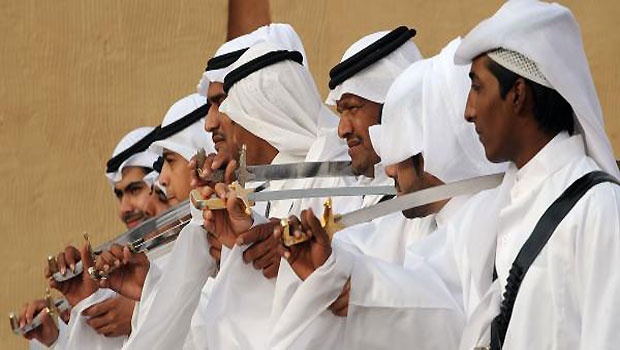
Saudi dancers perform during the Janadriyah festival of Heritage and Culture held in the viallge of al-Thamama, 40 kilometres north of the capital Riyadh on April 10, 2013. (AFP PHOTO / FAYEZ NURELDINE)
First, the National Guard in Saudi Arabia is not an official military institution. Its roots are in the people—in other words, the tribes. As we know, King Abd Al-Aziz, the founder of Saudi Arabia, conquered the city of Riyadh, his family’s ancestral home, in 1902. He then consolidated his control over the Najd in 1922 and conquered the Hijaz in 1925. Having conquered almost all of central Arabia, he united his dominions into the Kingdom of Saudi Arabia in 1932.
This meant he had to unite all of the tribes to form Saudi Arabia as a country. It is said that his especial legacy was establishing an institute to organize all tribes, and that turned out to be the National Guard.
Secondly, Sheikh Abdulaziz Tovaijeri was one of the closest disciples of King Abd Al-Aziz. He was a man of culture and wisdom, and his knowledge of Arabic literature was unique. I believe his books about Al-Mutanabbi and Abul Ala Al-Ma’arri are still among the best books about the two great poets. He founded the Janadriyah Festival in 1986.
In other words, Tovaijeri tried to create a cultural face for the National Guard. As we know, there is often a big gap between military institutions and culture. The relationship between power and belief is a very important Islamic tradition: we should make a bridge between the sword, as a symbol of the military, and the pen, the symbol of thought and culture and faith.
A soldier needs to get to know his weapon, and then learn how to use it. He should also understand for what purpose he has to use his weapon. This is where thought and culture come into play: to convince the soldier that, for instance, our country faces an existential threat, and so we should defend our nation, our country and its territories.
Obviously, every soldier needs to be able to justify his deeds. He should be able to justify why he kills another man as an enemy. What is the real meaning of “enemy” and “animosity”?
In the Qu’ran we find a key verse, one which interprets the meaning of life and death:
[blockquote]Remember, when you were on the near side of the valley, and they were on the farther side, and the caravan was lower in position than you. If you had made an appointment to meet, you would have missed the appointment. But it was so that Allah might accomplish a matter already destined—that those who perished through disbelief would perish upon evidence and those who lived in faith would live upon evidence; and indeed, Allah is Hearing and Knowing. (Sura 8, v. 42)[/blockquote]
There are crucial times and situations, when a man must choose between life and death. This is an eternal tragedy of human beings; this is the coin of life with two sides, life and death. Every moment that we live in this world takes us one moment closer to our death.
I believe it is the duty of a writer to interpret the meaning of life, and explain death. Ali Harb—a well-known Lebanese philosopher—famously said in his panel in Janadriyah that we are the victims of our thoughts. During Janadriyah and after it ended, I pondered Ali Harb’s famously short yet profound sentence.
The Taliban and Al-Qaeda think; they make a bridge between the sword and their thoughts, but their first battle should be against their own thinking, for they are the victims of their style of thought and the style of life.

Trackbacks/Pingbacks